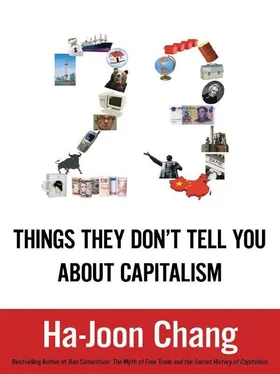Britain, the country which many people think invented free trade, built its prosperity on the basis of policies similar to those that Hamilton promoted. This was not a coincidence. Although Hamilton was the first person to theorize the ‘infant industry’ argument, many of his policies were copied from Robert Walpole, the so-called first British Prime Minister, who ran the country between 1721 and 1742.
During the mid eighteenth century, Britain moved into the woollen manufacturing industry, the high-tech industry of the time that had been dominated by the Low Countries (what are Belgium and the Netherlands today), with the help of tariff protection, subsidies, and other supports that Walpole and his successors provided to the domestic woollen manufacturers. The industry soon provided Britain’s main source of export earnings, which enabled the country to import the food and raw materials that it needed to launch the Industrial Revolution in the late eighteenth and the early nineteenth centuries. Britain adopted free trade only in the 1860s, when its industrial dominance was absolute. In the same way in which the US was the most protectionist country in the world during most of its phase of ascendancy (from the 1830s to the 1940s), Britain was one of the world’s most protectionist countries during much of its own economic rise (from the 1720s to the 1850s).
Virtually all of today’s rich countries used protectionism and subsidies to promote their infant industries. Many of them (especially Japan, Finland and Korea) also severely restricted foreign investment. Between the 1930s and the 1980s, Finland used to classify all enterprises with more than 20 per cent foreign ownership officially as ‘dangerous enterprises’. Several of them (especially France, Austria, Finland, Singapore and Taiwan) used state-owned enterprises to promote key industries. Singapore, which is famous for its free-trade policies and welcoming attitudes towards foreign investors, produces over 20 per cent of its output through state-owned enterprises, when the international average is around 10 per cent. Nor did today’s rich countries protect foreigners’ intellectual property rights very well, if at all – in many of them it was legal to patent someone else’s invention as long as that someone else was a foreigner.
There were exceptions of course. The Netherlands, Switzerland (until the First World War) and Hong Kong used little protectionism, but even these countries did not follow today’s orthodox doctrines. Arguing that patents are artificial monopolies that go against the principle of free trade (a point which is strangely lost on most of today’s free-trade economists), the Netherlands and Switzerland refused to protect patents until the early twentieth century. Even though it did not do it on such principled grounds, Hong Kong was until recently even more notorious for its violation of intellectual property rights than the former countries. I bet you know someone – or at least have a friend who knows someone – who has bought pirated computer software, a fake Rolex watch or an ‘unofficial’ Calvin & Hobbes T-shirt from Hong Kong.
Most readers may find my historical account counter-intuitive. Having been repeatedly told that free-market policies are the best for economic development, they would find it mysterious how most of today’s countries could use all those supposedly bad policies – such as protectionism, subsidies, regulation and state ownership of industry – and still become rich.
The answer lies in the fact that those bad policies were in fact good policies, given the stage of economic development in which those countries were at the time, for a number of reasons. First is Hamilton’s infant industry argument, which I explain in greater detail in the chapter ‘My six-year-old son should get a job’ in my earlier book Bad Samaritans . For the same reason why we send our children to school rather than making them compete with adults in the labour market, developing countries need to protect and nurture their producers before they acquire the capabilities to compete in the world market unassisted. Second, in the earlier stages of development, markets do not function very well for various reasons – poor transport, poor flow of information, the small size of the market that makes manipulation by big actors easier, and so on. This means that the government needs to regulate the market more actively and sometimes even deliberately create some markets. Third, in those stages, the government needs to do many things itself through state-owned enterprises because there are simply not enough capable private sector firms that can take up large-scale, high-risk projects ( see Thing 12 ).
Despite their own history, the rich countries make developing countries open their borders and expose their economies to the full forces of global competition, using the conditions attached to their bilateral foreign aid and to the loans from international financial institutions that they control (such as the IMF and the World Bank) as well as the ideological influence that they exercise through intellectual dominance. In promoting policies that they did not use when they were developing countries themselves, they are saying to the developing countries, ‘Do as I say, not as I did.’
A pro-growth doctrine that reduces growth
When the historical hypocrisy of the rich countries is pointed out, some defenders of the free market come back and say: ‘Well, protectionism and other interventionist policies may have worked in nineteenth-century America or mid twentieth-century Japan, but haven’t the developing countries monumentally screwed up when they tried such policies in the 1960s and 70s?’ What may have worked in the past, they say, is not necessarily going to work today.
The truth is that developing countries did not do badly at all during the ‘bad old days’ of protectionism and state intervention in the 1960s and 70s. In fact, their economic growth performance during the period was far superior to that achieved since the 1980s under greater opening and deregulation.
Since the 1980s, in addition to rising inequality (which was to be expected from the pro-rich nature of the reforms – see Thing 13 ), most developing countries have experienced a significant deceleration in economic growth. Per capita income growth in the developing world fell from 3 per cent per year in the 1960s and 70s to 1.7 per cent during the 1980–2000 period, when there was the greatest number of free-market reforms. During the 2000s, there was a pick-up in the growth of the developing world, bringing the growth rate up to 2.6 per cent for the 1980–2009 period, but this was largely due to the rapid growth of China and India – two giants that, while liberalizing, did not embrace neo-liberal policies.
Growth performances in regions that have faithfully followed the neo-liberal recipe – Latin America and Sub-Saharan Africa – have been much inferior to what they had in the ‘bad old days’. In the 1960s and 70s, Latin America grew at 3.1 per cent in per capita terms. Between 1980 and 2009, it grew at a rate just above one-third that – 1.1 per cent. And even that rate was partly due to the rapid growth of countries in the region that had explicitly rejected neo-liberal policies sometime earlier in the 2000s – Argentina, Ecuador, Uruguay and Venezuela. Sub-Saharan Africa grew at 1.6 per cent in per capita terms during the ‘bad old days’, but its growth rate was only 0.2 per cent between 1980 and 2009 ( see Thing 11 ).
To sum up, the free-trade, free-market policies are policies that have rarely, if ever, worked. Most of the rich countries did not use such policies when they were developing countries themselves, while these policies have slowed down growth and increased income inequality in the developing countries in the last three decades. Few countries have become rich through free-trade, free-market policies and few ever will.
Читать дальше






![Ally Carter - [Gallagher Girls 01] I'd Tell You I Love You But Then I'd Have to Kill You](/books/262179/ally-carter-gallagher-girls-01-i-d-tell-you-i-lo-thumb.webp)





